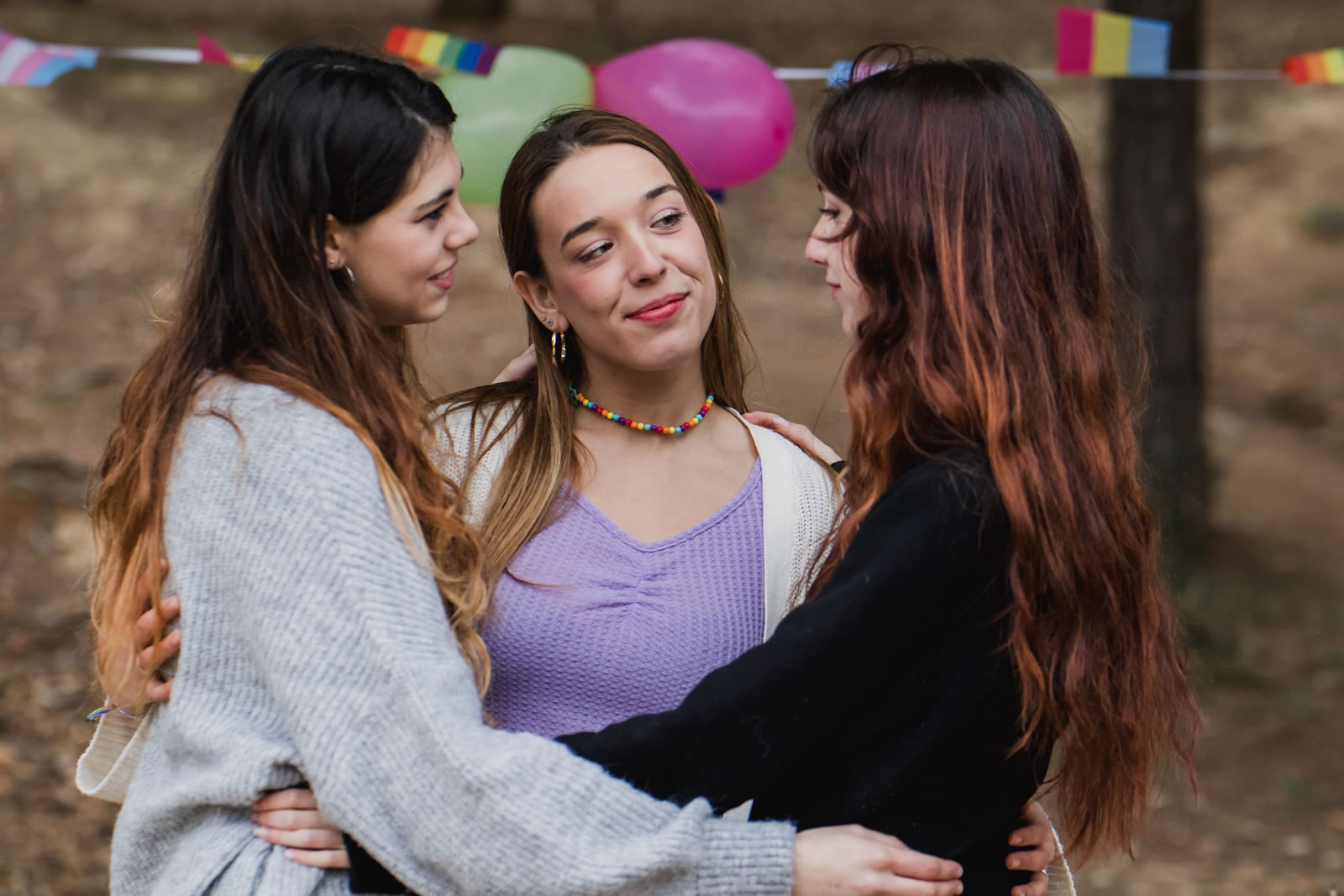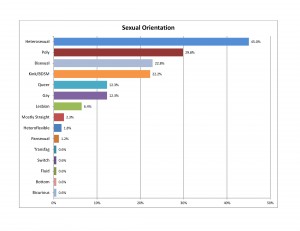
How did I become interested in working with kinky and poly people?
In 1989, I was a college student, shelving books at the indie bookstore where I volunteered, when The Lesbian S/M Safety Manual fell into my lap. I was fascinated. What was lesbian S/M? And what did it have to do with safety? The book was an eye opener. I learned that there was an entire sexual world about which I knew absolutely nothing.
When I moved to New York City, I met my first kinky and poly friend who encouraged me to join The Lesbian Sex Mafia with her. I was a member between 1992 – 1995 and I attended safety workshops, educational events, play parties, and social gatherings. I moved to the Bay Area in 1995 and started graduate school in 1996. I spent much of the late 90’s attending play parties, in search of the psychopathology I had read about in my text books. But I couldn’t find it. For the most part, play parties introduced me to a bunch of friendly, lusty, curious, and creative people who wanted to find safe and interesting ways to enhance their erotic lives.
I was intrigued by the discrepancy between what I had heard in academic settings about psychopathology and BDSM and the reality of my experience and observations in BDSM spaces. I was also fascinated by people who were enthusiastically stepping deeper into finding the keys to unlocking their core erotic selves and sharing that with others. As a result, I decided to study clinician bias in mental health services to the kink community.
That said, don’t worry that becoming my psychotherapy client means we’ll bump into one another at play or sex parties. I haven’t attended one since 2000. But I will know what you’re talking about, and I won’t judge you.
I do occasionally attend events in which there is an educational component and if I know in advance that we may cross paths at such an event, we’ll discuss it together.
Why do I offer kink-aware and poly friendly psychotherapy and counseling services for BDSM and altsex folks?
Because I recognize that sexual diversity is more than just LGBTQ. Because I believe all people deserve to meet with a clinician who understands their identity issues and sexual practices without unnecessarily making that a focus of treatment. Because even though I practice in San Francisco, many local clinicians are still not well-educated when it comes to BDSM, kink, and polyamory. I specialize in working with altsex populations and sexual diversity. I also have found myself continually moved by the people in my life and my practice who work on the practice of ethical and consensual non-monogamy. I have found great inspiration in people who seek expansive relationships of growth vs. restriction. But I also recognize that these relationships are not ideal for everyone.
How many LGBTQ, kinky, altsex, or poly-identified clients have I worked with?
This is a question I’m often asked by new clients. The following chart shows the sexual orientations that people who have come to my office have written on their intake forms (in their own words). Note that the categories do overlap (e.g. – some may write both queer and poly on the intake form when asked about how they identify, and others may select heterosexual and kinky). This snapshot of my practice stats is from October, 2014 and it includes all people seen since my practice opened in 2008.
Click on the chart below to enlarge it.
As a kink-aware and poly friendly clinician:
I won’t assume that the issue you’re seeking help with is caused by or is related to your kink or poly orientation.
I won’t make assumptions about your treatment goals – particularly that these goals include changing your sexual desires.
I won’t try to “cure” you of BDSM or poly desires.
I will be aware that any distress you have about your kink or poly identity may be a normal part of internalized cultural bias against your sexual orientation rather than evidence of a disorder. I will help you to locate and get support from community resources.
I will be sensitive to whether and how your kink or poly identity affects your work, social, and family relationships.
I will not assume abuse when you are in a BDSM relationship. I will not assume you are cheating or are tolerating cheating if you bring up other partners.
I will not assume that BDSM interests mean that you are not also interested in vanilla sexual behaviors.
If you have experienced abuse within a BDSM relationship, I can help you to process and understand that. I know that this can sometimes happen and that it can be very difficult to talk about.
I can help you to navigate the terms of your poly relationship and negotiate agreements that best serve you and your partners, identifying and honoring your needs.
I will remain aware of my own issues and how they may enter the therapy. I will consult with colleagues who are knowledgeable about altsex behavior if you bring in issues that are outside of my knowledge base or boundaries of competence.

Research
My commitment to providing services to kinky, BDSM, poly, and altsex clients began when I was in graduate school and I wrote my dissertation on assessing bias in mental health services to BDSM clients.
Advocacy
In order to better serve altsex communities and help clients find accepting and knowledgable clinicians, in 2009, I founded (and served as President for 9 years) of Open Minds: Psychotherapists Affirming Sexual and Gender Diversity. This San Francisco, Bay Area based group helps clinicians and trainees who work with sexual and gender diversity to network, consult, and support one another. We also have a directory to help Bay Area clients find psychotherapists. I have also sat on the board for TASHRA.
Publications
To read more of my work with BDSM, kink, poly, and altsex communities, you can find the following publications:
- Kolmes, K. & Witherspoon, R.G. (2017). Therapy with a consensually nonmonogamous couple. Journal of Clinical Psychology: In Session. Special Issue on Science, Sexuality, and Psychotherapy.doi: 10.1002/jclp.22509
- Kolmes, K. (2015, October). An introduction to BDSM for psychotherapists. [Web article]. Retrieved from: http://www.societyforpsychotherapy.org/an-introduction-to-bdsm-for-psychotherapists
- Kolmes, K. (2012). 50 Shades of Sitgma: Are we as kinky as we think we are? Blog post for Psyched in SF.
- Kolmes K., & Witherspoon, R. G. (2012). Sexual Orientation Microaggressions in Everyday Life: Expanding our Conversations about Sexual Diversity. Independent Practitioner, Summer 2012.
- Kolmes, K., & Weitzman, G. (2010). A guide to choosing a kink-aware therapist. National Coalition for Sexual Freedom.
- Kolmes, K., Stock, W., Moser, C. (2006). Investigating bias in psychotherapy with BDSM clients. Journal of Homosexuality, 50 (3/4).
- Kolmes, K (2003). BDSM consumers of mental health services: the need for culturally sensitive care. Doctoral dissertation, CSPP-AIU. Reprinted and catalogued by CSPP-AIU library.
Press - In December, 2019, Dr. David J. Ley posted a blog post on Psychology Today on Therapy with Kink: An End to Shame. He cites my research and talks about the new guidelines being developed for working with kinky folks.
- In March of 2019, Rachel Kramer Bussell sought to understand her shift from kinky desires to more vanilla ones in I Suddenly Stopped Being Kinky and I’m not sure why. She spoke with me and other experts.
- In 2018, Dating Advice interviewed me about my work and wrote up a story about my work with the broad range of gender and sexual expression.
- Shades of Grey’s Kink Scenes Whipping Up a Frenzy? Not in SF. Carolyn Zinko wrote a piece for the SF Chronicle on how 50 Shades is opening some people up to kink, but where to really go if you want to learn more about BDSM. Some quotes from me on dispelling the myths that kink is all about pain play.
- 50 Shades of Care: Why Doctors Need to Pay More Attention to Their Kinky Patients. This Quartz piece written by Christy Duan spoke with a number of health care providers and kinky patients about their experiences in the doctor’s office and why health care providers need to learn more about kink.
- Coming out Kinky to Your Doctor, in Black and Blue is a piece written by Heather Boerner in The Daily Beast. She writes about the need for kinky people to have access to kink-informed health care providers and quotes me.
- Clinician’s Corner: Your Editor Interviews Keely Kolmes, Psy.D. about “Kink”, Polyamorous Relationships and the “Bay Area Open Minds” Organization. San Francisco Psychological Association’s Summer Newsletter.
- The Good Vibrations Online Magazine also interviewed me about Bay Area Open Minds, the group I founded for mental health professionals.
Presentations - In 2013, 2015, 2016, 2018, and 2019, Richard Sprott, PhD, Ryan Witherspoon, MA, and I presented our 50 Shades of Grey in Therapy: Working with BDSM/Kink Sexualities and Communities at the American Psychological Association’s Annual Convention. We turned this into an online course in 2016 to help reach other professionals who need this training.
- On February 22, 2014, I did an “Ask the Psychologist” presentation for The Society of Janus. I will be doing another in March of 2015.
- On Friday, August 3, 2012, I gave a talk entitled Stigma Squared: Understanding Kink in LGBT Communities as part of a Symposium entitled The Revolution Within: Sexpositivity and Celebrating Sex Within LGBT Communities with Theodore R. Burnes, Ph.D., MEd, Ryan Witherspoon, B.A., Anneliese A. Singh, Ph.D.
